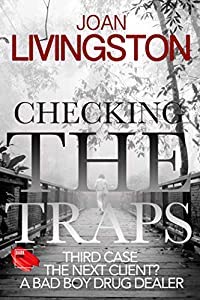As readers of my Isabel Long Mysteries know, I like to carry many characters throughout the series. Often their role changes. That’s certainly the case for Cyrus Nilsson aka the Big Shot Poet, Isabel’s secret nickname for him. He’s a key figure in my next mystery, Missing the Deadline.
Cyrus is indeed a noted poet, hence the snarky nickname the irreverent Isabel Long secretly calls him. He made it big after growing up poor with the release of his first book of poetry, Yonder. He’s done well for himself, building a swanky home in the hilltown of Penfield and driving a Mercedes. He has a slew of adoring fans, mostly women. He’s quite the charmer. And, no, I don’t know anybody like him. Cyrus is a figment of my imagination.
And he was a suspect in Checking the Traps, the series’ third book. That case involved the death of Cary Moore, a highway worker who wrote poetry good enough for Cyrus to steal. Well, he actually paid Cary for the poems, but he put his own name on them in a book that garnered big awards. Isabel, who discovered that, wonders how that bit of news would go over with his publisher and fans.
(One of my favorite scenes in Checking the Traps is a bookstore reading Isabel and her mother attend. I tried to capture poetry readings I’ve attended, including those loud sighs from adoring fans.)
So Cyrus decides to make amends by getting some of Cary’s poems published in a book called Country Boy. If that sells well, there are many other poems in notebooks Isabel found during her investigation.
By the way, that book allowed me to write poetry, something I haven’t done in a very long time.
And in Missing the Deadline, Cyrus also tries to make amends with his first agent, the one who discovered him. After making a name for himself, Cyrus dumped Gerald Danielson. But he wants to find justice for his first agent after he was found shot and left to die. The cops ruled it a failed attempted suicide, but Cyrus approaches Isabel because he has his doubts.
In the book’s opening scene, Cyrus is in full-charm mode at a reading he is doing for Country Boy at the Penfield Town Hall. He makes his pitch to Isabel afterwards.
Cyrus has a big role in this book, and I so enjoyed giving him that. Isabel doesn’t mind pushing his buttons, and he takes this in his Big Shot Poet way. I also give him an unlikely romance in this book. My lips are sealed on that one, but I bet readers will get a kick out of that development.
Here’s an excerpt from the second chapter. Cyrus calls Isabel over for a private talk after the reading has been completed.
“That was a wonderful event,” I tell him. “You were a big hit with the audience telling those stories about Cary. I’m glad you asked the Plowboys to play after all. Nice touch.”
“Thanks, but I didn’t call you over, so you can kiss my butt,” Cyrus says, drawing a laugh from me. “I have something important to ask you.”
“Important? Go ahead.”
“I believe I might have a case that will interest you.”
Now, this is unexpected, but then again I’ve found a few of my cases in unlikely places like a pig roast and a country fair. A poetry reading? Okay, Cyrus, I’m listening.
“Well, you do have my interest. I want to hear more.”
Cyrus glances around. The Town Hall’s custodian and a couple of helpers are folding chairs and loading them onto a cart. It appears we will be getting kicked out soon.
“This isn’t the place or time to go into detail. But it concerns my first literary agent, Gerald Danielson. He’s the one who gave me my big break,” he says. “He used to live in New York but moved to Meadows Falls.”
Meadow Falls is directly east of Caulfield. It’s actually a village made up of parts of the towns of Meadows and Granite on either side of the Ridge River. Meadows Falls is a bit of an unknown for me since it wasn’t part of The Daily Star’s coverage area. Sam and I visited it a few times, but it’s been years. I recall the village is a low-key but charming tourist spot. Think restaurants and little shops on the artsy side. The Ridge River running through it has interesting rock formations and two bridges, one for traffic and the other for fans of flowers called the Bridge of Blossoms, a big attraction when it’s open for the season.
Frankly, I don’t know a soul who lives there. Would that scare me off from taking a case? No, of course, not.
But Cyrus wouldn’t be interested in any of that.
“Let me guess,” I say instead. “His death was ruled an accident, but you have your doubts.”
Cyrus shakes his head.
“It’s my understanding that is a particular area of expertise for you.”
“That and a couple of others.”
“Good because Gerald isn’t dead although he came close. He was shot in the head and left to die in his backyard. But he was too tough to do that. Gerald still lives, but the man is nothing like what he used to be. I saw that for myself when I visited him and his sister.”
“Go on. And the cops didn’t catch whoever did it.”
“The official ruling was that it was an attempted suicide. Perhaps, money was an issue for his agency. I’m sure there’s more to it than that. Afterward, when he had recovered, Gerald couldn’t tell the police what happened. He has cognitive issues because of his brain injuries. And apparently, there were no witnesses.” Cyrus makes one of his charming smiles. “I’ve been following you in the news. Well done, Isabel, on that last case. You’re making a name for yourself. That case was nearly fifty years old. This one happened only three years ago.”
Oh, brother, the tables are turned and the Big Shot Poet is kissing my you-know-what. But I aim to keep an open mind. Investigate the shooting of a literary agent? My cases thus far have included a junkyard owner and newspaper editor, so why not a literary agent? I certainly would like to do a little online research on this Gerald Danielson before we meet again. Maybe the Old Farts have some info since their reach tends to extend far.
“Cyrus, you have my attention, but I will need to hear a whole lot more before I say yes. When can we do that?”
“How about tomorrow at my house, say one?” he says.
“You’re really serious about this.”
“I am. And please bring your mother. I want to hear what she has to say.”
“Will do.”
MORE ABOUT MISSING THE DEADLINE: This book will be released Dec. 21 on Kindle. If you pre-order now, it is most helpful, so I thank you if you do. Plus your book will magically pop into your device that day. Paperback writers will have to wait a few months. Here is the link: Missing the Deadline.
SUBSTACK: I’ve just discovered Substack, through an author friend’s recommendation. Basically, it’s “an online platform that provides publishing, payment, analytics, and design infrastructure to support subscription newsletters.” Most writers give free and paid options for subscriptions. (Yes, people make money.) Mine is free. My newsletter is called Joan Livingston Writes. (Some people use catchier names.) My subtitle is “A bookish mix of mystery and discovery in rural New England.” I’ll be posting observations, experiences and, of course, stuff about writing.
I invite you to subscribe to my newsletter and if you like what you see, start your own newsletter. And I would certainly subscribe to yours. If you are already on it, please let me know.
Here’s the link: JOANLIVINGSTON.SUBSTACK.COM
ABOUT THE PHOTO ABOVE: That’s a moody photo, untouched, of the Deerfield River in our village of Shelburne Falls as it passes behind our son Zack’s Floodwater Brewing.





